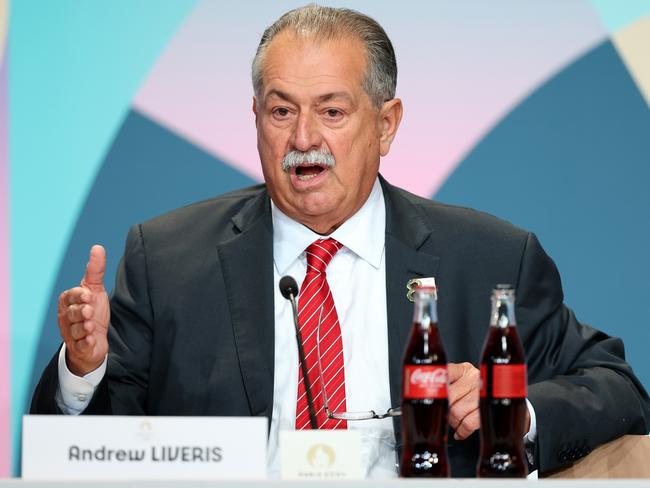Editorial: Why did Games boss feel the need to shake off ‘hillbilly town’ tag?
Far from being the nation’s biggest country town, Brisbane is emerging as a genuine world city, writes the editor.
Opinion
Don't miss out on the headlines from Opinion. Followed categories will be added to My News.
It is encouraging that Brisbane Olympic committee boss Andrew Liveris believes our capital city is “not a hillbilly town”. But why did he even feel the need to raise the topic, as Mr Liveris did when talking to journalists in Paris on Tuesday after a session of the International Olympics Committee?
Has Brisbane not well and truly shaken off the northern redneck, big-country-town caricatures once so favoured by southerners?
We can only assume Mr Liveris felt the need to reassure the world of the truth that Brisbane is now clever and worldly enough to put on a spectacular games exactly eight years from this week because of the keystone cops performance by our politicians since our state won the 2032 bid three years ago.
That stumbling and bumbling by pointscoring politicians with an eye on nothing more than the next election certainly has not helped build confidence in Queensland’s ability to get its Olympic and Paralympics Games act together.
First, we had then premier Annastacia Palaszczuk catching everyone off-guard by declaring an upgraded Gabba would be the main Olympic stadium – at what it turns out was a made-up cost of $1bn.
Then this year came new Premier Steven Miles’s attempt to defang growing public anger about the plan – both because of disruption to the local community and the fact the real cost turned out to actually be around $3bn – by setting up an independent inquiry to look for other options. But the inquiry, headed by former lord mayor Graham Quirk, turned out to be too independent. It came back with a plan Mr Miles did not like – a $3bn stadium at inner-city Victoria Park.

The government’s response was to announce a new idea – a totally untested proposal to “upgrade” the old 50,000-seat Queensland Sport and Athletic Centre at Chandler (the venue formerly known as the QEII Stadium) into what would be the smallest Olympics athletics venue since 1928 – a 40,000 temporary facility that would end up being a 14,000-seat athletics-only facility after 2032. The cost was said to be $1.6bn for the permanent solution, and more – apparently to be paid for by Olympics organisers – for the 26,000 temporary seats.
But will it be that? Who knows. It turns out that $1.6bn cost was also just made up. We won’t know the real cost until a business case being done into it is completed – and that, unsurprisingly, will only come after the October 26 election.
That election is at the heart of the issue. Both the government and the Opposition have decided that it is political poison to talk about a new stadium now, and so are doing all they can to avoid it until after cash-strapped Queenslanders have had their say at the ballot box.
In other words, we have to wait at least another three months to find out what the real plan might be for our Games in 2032 – having already endured three years of false starts.
Despite all that, Mr Liveris remains reassuringly optimistic, writing for us this week that: “My message to IOC Members is simple. Brisbane is on track to host a great Games in 2032.”
But you can feel his pain when Mr Liveris also urges politicians to “stop making the Olympics a political football” – and revealing yesterday that the ticket revenue shortfall from a smaller stadium will mean organisers will likely have to add other sports held elsewhere.
We remain absolutely confident we have the capacity and the skills to organise a world-class Games, and we echo Mr Liveris in assuring the world that Brisbane is not a Hicksville – despite our politicians trying to prove otherwise.
But we do also understand that the last few months before an election are not exactly the right time to have this debate – as those who will be voting are enduring a genuine cost-of-living crisis.
Here is a core truth, however: Far from being the nation’s biggest country town, Brisbane is emerging as a genuine world city – and every world city needs a world-class stadium or two, not for a few weeks for Olympic and Paralympic athletics but for concerts and sporting events that fire up the economy every single weekend.
NRL’S WONDER WOMAN
Most attention will no doubt be on the amazing athletic performances at the Paris Olympics over the next two weeks, but with the NRLW season kicking off tonight you do not need to look further afield for world-class sport.
The women’s game has had a rapid rise in popularity – and television ratings – over the past couple of years, to the point where NRL boss Andrew Abdo this week outlined plans for a professional competition from when the game’s new broadcast deal starts, in 2028.
The NRLW launched in 2018 with four teams. There are now 10, and plans for two more in 2025. Each team will play each other once across nine rounds, with a two-week finals series to follow featuring the top four teams. That follows the first three-game State of Origin series – that sold out in Newcastle and Townsville and featured a Suncorp Stadium match the night before Magic Round.
We wish all the players the best, and suggest any league fans who are still sceptical to take a look.
Responsibility for election comment is taken by Chris Jones, corner of Mayne Rd & Campbell St, Bowen Hills, Qld 4006. Printed and published by NEWSQUEENSLAND (ACN 009 661 778). Contact details here




